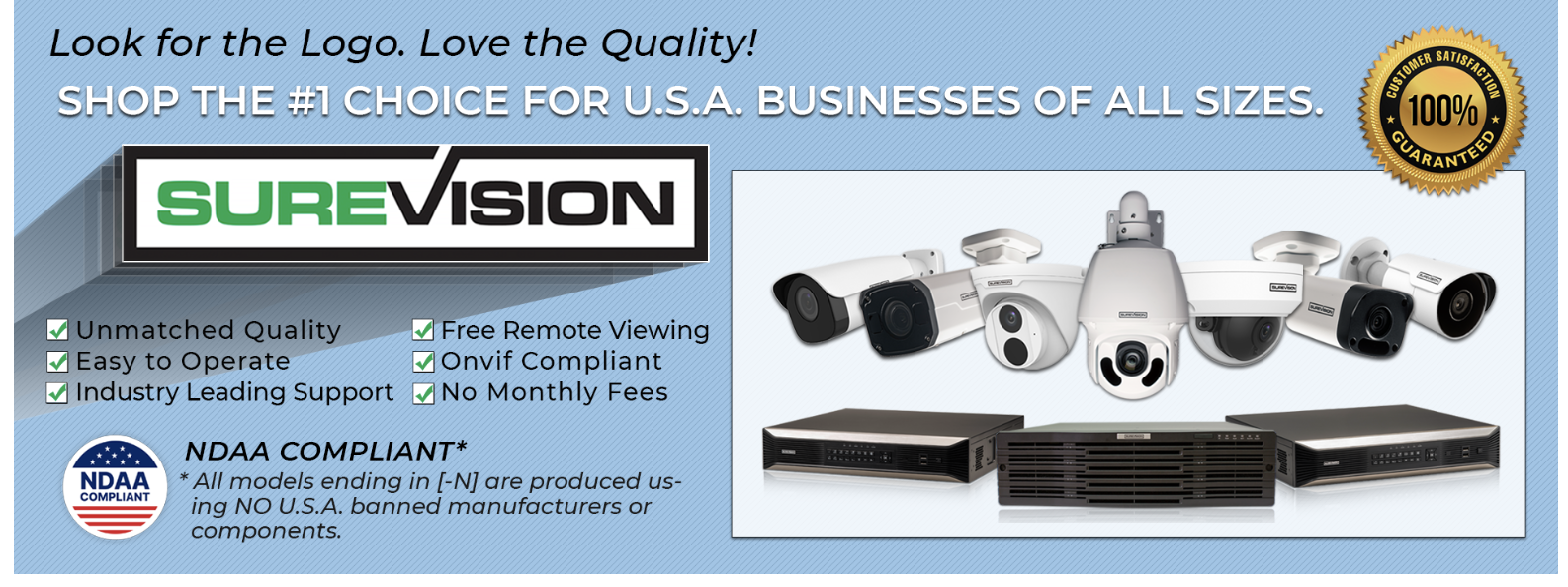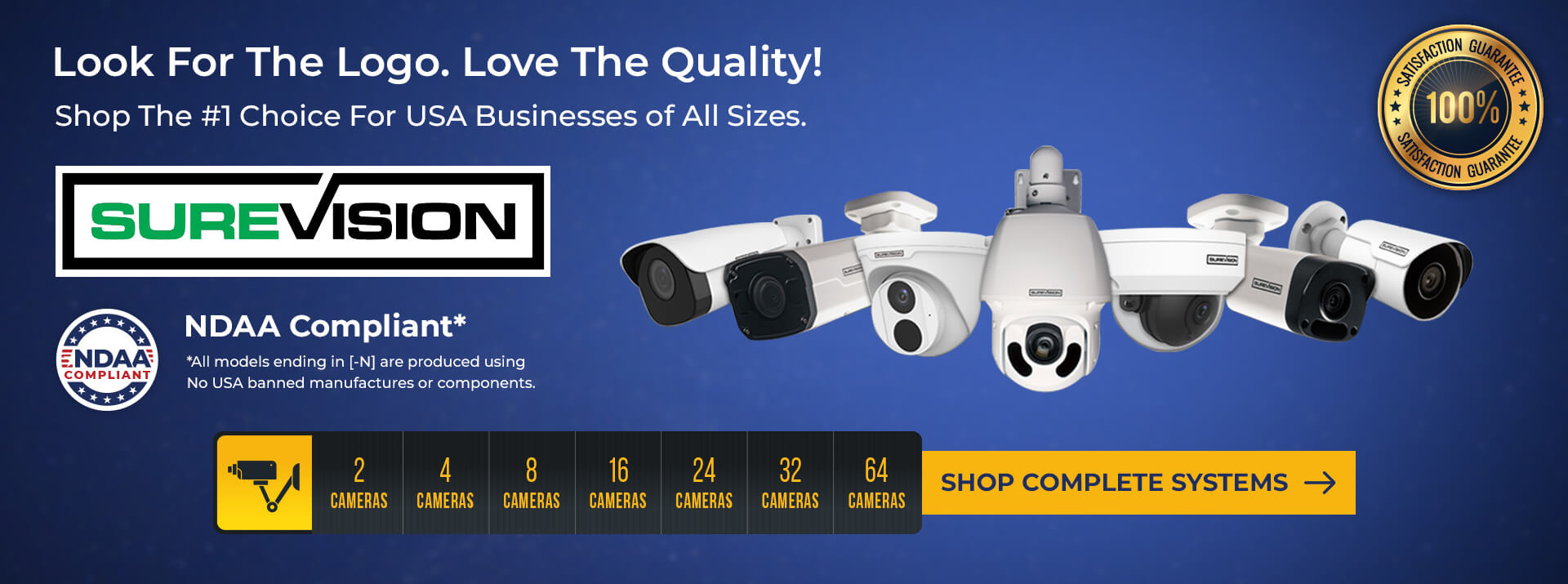NDAA Compliant Security Camera Systems: Ensuring Safety and Compliance
Posted by Gregory Derouanna, MBA on Oct 2, 2024
NDAA Compliant Security Camera Systems
Important to the government, business and home
In today's world, security is paramount. Whether you're protecting a small business or a large government facility, having a reliable and trustworthy security camera system is crucial. But what happens when your security system itself becomes a potential threat? This is where NDAA compliant security camera systems come into play. Let's dive into the world of these cutting-edge security solutions and understand why they're becoming increasingly important in our digital age.
What is the NDAA?
Before we delve into the specifics of NDAA compliant camera systems, let's first understand what NDAA stands for. NDAA is an acronym for the National Defense Authorization Act. It's an annual piece of legislation in the United States that specifies the budget and expenditures for the Department of Defense. But why are we talking about defense budgets in relation to security cameras? Well, that's where things get interesting.
Understanding NDAA Compliance for Security Cameras
In recent years, the NDAA has included provisions that directly impact the use of certain security technologies. Specifically, Section 889 of the 2019 NDAA prohibits the U.S. government and its contractors from using telecommunications equipment and video surveillance products from certain Chinese companies due to security concerns. This is where NDAA compliance for security cameras comes into play.
NDAA compliant security camera systems are those that meet the stringent requirements set forth by this legislation. These systems are designed to provide top-notch security without the potential vulnerabilities associated with banned technologies. But what exactly makes a camera system NDAA compliant? Let's explore.
Key Features of NDAA Compliant Camera Systems
Secure Data Transmission
One of the primary concerns with non-compliant systems is the potential for data interception. NDAA compliant cameras use advanced encryption protocols to ensure that all data transmitted from the camera to the storage device or monitoring station is secure. This means that even if someone were to intercept the data, they wouldn't be able to decipher it.
Encrypted Storage
It's not just about securing data in transit. NDAA compliant systems also ensure that stored footage is encrypted. This provides an additional layer of protection against unauthorized access or data breaches.
Tamper-Proof Hardware
Physical security is just as important as digital security. NDAA compliant cameras are designed with tamper-proof hardware, making it extremely difficult for anyone to physically alter or compromise the device.
Regular Software Updates
In the world of cybersecurity, staying up-to-date is crucial. NDAA compliant systems receive regular software updates to patch any potential vulnerabilities and ensure ongoing compliance with evolving security standards.
Benefits of NDAA Compliant Security Cameras
Enhanced Security
The most obvious benefit of NDAA compliant cameras is the enhanced security they provide. By eliminating potential backdoors and vulnerabilities, these systems offer peace of mind that your surveillance footage is secure from prying eyes.
Government Contracts Eligibility
For businesses looking to work with the U.S. government or its contractors, having NDAA compliant security systems is not just beneficial – it's essential. Non-compliant systems could disqualify you from lucrative government contracts.
Future-Proofing Your Security Infrastructure
As cybersecurity threats evolve, so do security standards. By investing in NDAA compliant systems now, you're future-proofing your security infrastructure against potential regulatory changes down the line.
___________________
Comparing Different Systems
Once you understand your requirements, it's time to compare various NDAA-compliant systems. aspects such as resolution, field of view, night vision capabilities, and storage options. Don't forget to evaluate the user interface and ease of use. A security system is only as good as your ability to use it effectively.
One popular line of NDAA-compliant camera systems is available at CCTVSecurityPros. These cameras are suitable for government use and entities with government contracts. This requirement exists due to network safety concerns with some manufacturers.
"Section 889 of the 2019 NDAA prohibits the U.S. government and its contractors from using telecommunications equipment and video surveillance products from certain Chinese companies due to security concerns."
This explains why NDAA compliance is crucial whne you purchase security cameras and systems.
Therefore, it makes sense to choose an NDAA-compliant security camera system for your business and home, ensuring that your network video recorder and surveillance cameras meet these standards.

Why choose SureVision to adhere to NDAA standards for your video surveillance?
SureVision provides you peace of mind in a connected world
- Safeguard your data from potential security breaches
- Protect your business from cyber threats and unauthorized access
- Stay ahead of evolving security challenges with trusted technology
SureVision makes government compliance easy
- Meet government requirements effortlessly with our certified systems
- Avoid potential legal issues and contract complications
- Streamline your procurement process with pre-approved equipment
SureVision will future-proof your security infrastructure
- Invest in systems that meet current and future regulatory standards
- Adapt to changing security landscapes with flexible, upgradable solutions
- Ensure long-term compatibility with government and business networks
SureVision IP Camera Lineup: The Clear Choice
Crystal-Clear Surveillance in Any Condition
- Large selection of cameras including bullet, dome, PTZ, license plate, fisheye cameras and more
- Ability to customize your system based on your specific needs
- High-resolution imaging for crisp, detailed footage
- Advanced low-light capabilities for 24/7 monitoring
- Wide field of view to cover more area with fewer cameras
- Zoom cameras to focus in on objects or people far away
- Full features and firmware updates and enhancements with no subscription, monthly, or hidden fees
Robust Storage and Retrieval
- Ample storage options to retain footage for extended periods
- Quick and easy access to archived video when you need it most
- Secure backup solution to protect your valuable surveillance data
- Remote Live Viewing and Playback on Cell, PC, and Tablets with no monthly fees - ever
Seamless Integration and Scalability
- Compatible with existing security infrastructure
- Easily expand your system as your security needs grow
- Flexible options to suit businesses of all sizes
Considering Installation and Maintenance
Installation and maintenance are often overlooked aspects of choosing a security system. Some NDAA compliant systems might require professional installation, while others such as SureVision could be DIY-friendly. Consider your in-house technical capabilities and budget for ongoing maintenance when making your decision.
Uncompromised Security for Government and Business
Military-Grade Protection for Your Premises
- Experience top-tier security with our NDAA compliant camera systems
- Protect your network from potential threats and vulnerabilities
- Ensure compliance with government regulations and standards
Cutting-Edge Technology at Competitive Prices
- Access high-quality surveillance equipment without breaking the bank
- Enjoy features comparable to non-NDAA systems at similar price points
- Invest in long-term security without compromising on quality
User-Friendly Interface for Seamless Operation
- Intuitive controls designed for easy navigation and management
- Effortless setup and configuration for quick deployment
- Comprehensive training and support for optimal system utilization
Implementing NDAA Compliant Cameras in Your Organization
Implementing a new security camera system can be a daunting task, especially when compliance is on the line. Start by creating a comprehensive implementation plan. This should include timelines for installation, training for staff who will be using the system, and a plan for securely disposing of any non-compliant equipment.
Remember, NDAA compliance isn't just about the cameras themselves. Your entire video surveillance ecosystem, including storage devices and monitoring software, needs to be compliant. It's often best to work with a reputable security integrator who understands NDAA requirements to ensure full compliance.
Common Challenges and Solutions
One common challenge in implementing NDAA compliant systems is the potential need to overhaul existing security infrastructure. This can be costly and time-consuming. However, many manufacturers offer hybrid solutions that allow for gradual upgrades, helping to spread out costs and minimize disruption.
Another challenge is keeping up with evolving compliance standards. The solution? Stay informed. Subscribe to industry newsletters, attend security conferences, and maintain a relationship with your system provider to stay ahead of any regulatory changes.
The Future of NDAA Compliance in Security Technology
As we look to the future, it's clear that NDAA compliance will continue to play a significant role in the security technology landscape. We're likely to see even more stringent security requirements, possibly extending beyond just cameras to other IoT devices.
Artificial Intelligence and Machine Learning are also set to play a bigger role in NDAA compliant systems. These technologies could offer enhanced threat detection capabilities while still maintaining the strict security standards required for compliance.
Conclusion
NDAA compliant security camera systems represent the gold standard in surveillance technology. They offer enhanced security, ensure regulatory compliance, and provide peace of mind in an increasingly complex digital landscape. While implementing these systems may require some upfront investment, the long-term benefits in terms of security and potential business opportunities make them a wise choice for many organizations.
As we move forward in an era where digital threats are ever-present, NDAA compliant systems will likely become the norm rather than the exception. By understanding and embracing these technologies now, you're not just securing your present – you're investing in a safer, more secure future.
FAQs
- What happens if I use non-NDAA compliant security cameras?
Using non-compliant cameras could potentially expose you to security risks and may disqualify you from government contracts or partnerships.
- Can I upgrade my existing surveillance system to be NDAA compliant?
In some cases, yes. Some manufacturers offer firmware updates that can bring older systems into compliance. However, in many instances, a hardware upgrade may be necessary.
- Are NDAA compliant surveillance cameras more expensive?
While they can be more expensive upfront, the enhanced security and potential for government contracts often make them a cost-effective choice in the long run.
- Do I need NDAA compliant security cameras for my small business?
While not legally required for private businesses, NDAA compliant cameras offer superior security features that can benefit businesses of all sizes.
- How often do NDAA compliance standards change?
The NDAA is reviewed annually, and compliance standards can change. It's important to stay informed about any updates that might affect your security system.




